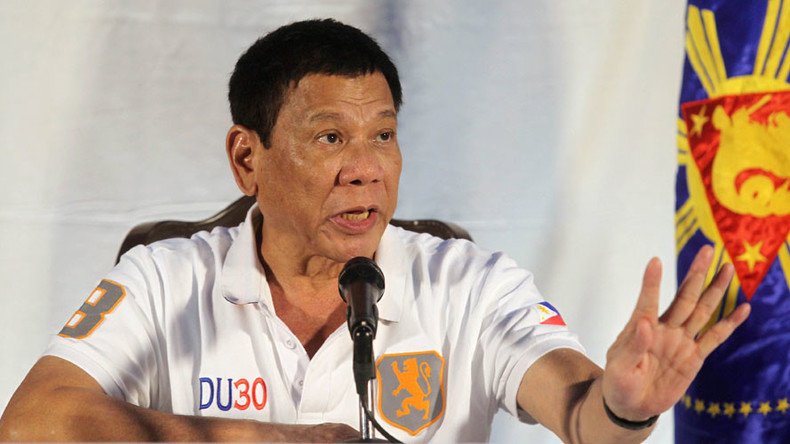'Filipino president ‘Duterte Harry’ won't take orders from former colonial powers’

Duterte is concerned about the prospect that Washington, the former colonial power in the Philippines, might want to manipulate his country against China, Gerald Horne, historian, told RT. Brian Becker of the AntiWar coalition also joins the conversation.
The Philippines' President Rodrigo Duterte delivered foul-mouthed rants about global bodies and other senior world officials. Moreover, he threatened to leave the UN after the organization labeled his war on drugs 'criminal'. He also lashed out at America.
‘I don't give a sh*t about them’: Philippine president threatens to leave ‘stupid’ UN https://t.co/q2ofPI76Ds
— RT (@RT_com) 21 августа 2016 г.
RT: What do you make of the provocative statements made by Philippine President Rodrigo Duterte?
Gerald Horne: Well first of all, that is his style. You may know that the recently elected president of the Philippines, Rodrigo Duterte, is referred to in a colloquial sense as ‘Duterte Harry’, in reference to a popular Hollywood cinema character, Dirty Harry, who oftentimes violated the rights of particular suspects. Mr. Duterte is also concerned about the prospect that Washington, the former colonial power in the Philippines, might want to manipulate the Philippines against China in light of a recent decision by the Permanent Court of Arbitration in The Hague that basically awarded certain rights to offshore islands to the Philippines. This helps to shed light on Mr. Duterte’s rather colorful language.
RT: Do you expect Washington to react in any way?
Gerald Horne: Not on the official level, not on the public level. As noted, Washington has very important military bases in the Philippines. Washington sees the Philippines as a kind of beachhead in the 21 century against China. Therefore, it wants to maintain very positive relations at least on the public and official level.
RT: The Philippines have a questionable human rights record, but the US says little about it. Is what you’ve just said the reason why they keep mum on such topics?
GH: Absolutely. That is the reason. Recall that just a few days ago President Duterte, in a gross violation of due process and human rights, released a non-vetted document accusing many high-level Filipino officials of drug dealing. This was a clear violation of these alleged suspects’ rights. You did not necessarily hear an outcry from Washington because of the Philippines’ strategic role in the US calculations.
Duterte not cookie-cutter president for US
Brian Becker, anti-war ‘Answer coalition’ said that Obama administration doesn't know what to make of Duterte as he is not fitting in American mold.
RT: Why do you think the Philippine president used such strong and offensive language when referring to an apparently close ally?
Brian Becker: It is not so much an alliance. The United States was the colonial power over the Philippines. A million Filipinos were killed when the US invaded in 1899, 1900, 1901, 1902 – a million people! And then the Philippines was formally a colony. It achieved formal independence after 1946 after a civil war led by nationalist and communist guerillas. But since that time, US military bases until 1992, when they were evicted, were the dominant part of the Philippines’ texture. Now, when you look at Duterte’s comments, those are the comments of somebody who is demanding that colonial powers like those who are dominating the UN no longer tell the Philippines what to do.
The bigger story right now is that in Oslo, Norway, Duterte is holding military peace talks with The New People's Army [NPA], the National Democratic Front, possibly ending the five-decade long civil war with the communist guerillas - the guerillas who have been labeled by the US as a terrorist entity. Duterte is breaking free from the dictates of the US. We see this in a number of policies.
RT: Do you expect Washington to react in any way?
BB: The US is playing it down right now, because the Obama administration doesn’t know really what to make of Duterte. He is not fitting in the mold; he is not a cookie-cutter president; he is something of a loose cannon; he’s a maverick. In his denunciations of the UN, he’s also really denouncing the US policies in the Middle East. He is angry about foreign colonial powers telling him what to do. That doesn’t mean we should justify vigilante killings in the so-called drug war – they are mainly killing poor people and people at the lower level of the drug trade. But Duterte is angry because he doesn’t want to be dictated to any longer by colonial powers.
The statements, views and opinions expressed in this column are solely those of the author and do not necessarily represent those of RT.












